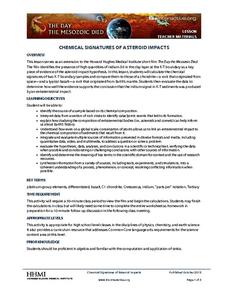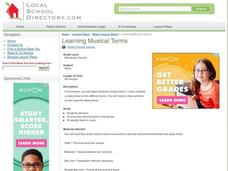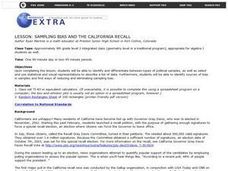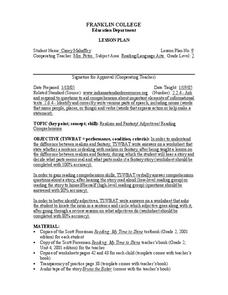Curated OER
Identifying the Beat
Sixth graders listen to various songs. In this musical properties lesson, 6th graders work in groups to identify musical selections, practice tapping the beat, review time signatures, and identify the meter of different songs.
North Carolina Standard Curriculum
Rhythm Counting
Understanding time signatures and rhythm counting are two very important parts of playing an instrument well. Here are three basic lessons rolled into one that prompt upper graders to play their instruments with care. They'll practice...
Curated OER
Telling time to the quarter hour
Second graders identify how to tell time to the quarter hour. Then they complete a worksheet of twelve problems on their own given ten minutes and getting at least eight correct. Students also practice telling time as a class while the...
Curated OER
Using Rhythm Instruments to Tell a Story
After watching a video of Peter and the Wolf, and identifying the instruments used to represent each character, class members use rhythm instruments to represent the actions in the song, "What Would I do."
Curated OER
6-8 Meter Madness
Students identify time signatures, the down beat, and begin to understand conducting patterns. In this meter patterns lesson, students identify the signs for 2/4, 3/4, and 4/4 and play an excerpt from a song. Students use tennis balls to...
Curated OER
Lines & Spaces; Another Round
Fourth graders recall the letter names of the notes of the C-major scale and identify the names of the C-major scale. They identify the names of the lines and spaces on a music staff. They sing rounds.
Howard Hughes Medical Institute
Chemical Signatures of Asteroid Impacts
What killed the dinosaurs and how do scientists know? Your high schoolers can examine these fascinating questions with a geochemical lens using the engaging 33-minute video, the accompanying data interpretation, and some thoughtful...
Concordia College Archives
History and Musical Aesthetics
What are the musical elements that characterize a school's fight song or its alma mater? Class members listen to examples of fight songs and alma maters from various schools, play a listening game, and then create a list of the...
Curated OER
Learning Musical Terms
Students observe and discuss the following musical terms and their symbols: staff, measure, bar line, double bar line, treble clef, bass clef, time signature, common time, cut time, quarter note, half note, dotted half note, whole note,...
Curated OER
RHYTHMIC PATTERNS
Students explore rhythmic patterns. They create and perform the rhythms and use Cubase software to perform, record, and play rhythms for use in dictation exercises. They identify and count rhythm patterns
Curated OER
Sampling Bias And the California Recall
Using a 2002 California Gray David recall vote as an example, young statisticians identify sources of bias in samples and find ways of reducing and eliminating sampling bias. They consider ways to select random samples from a...
Curated OER
Sequence, Predict, Infer: Pink and Say
Practice sequencing with your 2nd graders via Patricia Polacco's Civil War book Pink and Say. Begin with a blindfold and a bag of mystery items. Connect their use of clues to identify what they can't see with the skill of making...
Curated OER
Fats Waller, Handful of Keys
Playing piano is great fun and playing jazz is even better. Kids watch a video of Fats Waller playing the song, "Handful of Keys," they then use either a piano key print out or Orff instruments to practice his signature stride piano...
Curated OER
Problem Solving
Fourth graders complete a worksheet identifying unnecessary information regarding 8 different math problems. In this problem solving lesson, 4th graders discuss the meaning of colors on a spotlight in order to develop the skill of how to...
Curated OER
5 A Day
Students explore written music. In this cross-curriculum health and music instructional activity, students sing a "5 a Day" song about fruits and vegetables. Students clap a steady rhythm and identify written quarter notes in...
Curated OER
Realism and Fantasy
Second graders listen to the story, Bruno the Baker, where some parts seem real and some seem fake. They must identify the parts of the story as realism or fantasy. An interesting way to teach young readers these two concepts.
Curated OER
Friendly Letter Writing and Sentence Structure
Explore communication through writing by analyzing individual sentences with young writers. They practice writing compound sentences and identifying sentence fragments. The next step has them learn the five parts of a friendly letter....
Curated OER
First Rhythmic Composition
Young scholars apply fractions to counting rhythm in music. In this algebra lesson, students interrelate the concept of math into music as they fill out a chart identifying the names and symbols of music notes and their equivalent values...
Scholastic
Writing Letters of Gratitude
A lesson begins with a discussion on gratitude—what does it mean, and for who are learners thankful? Scholars share their thoughts and feelings then choose a community worker to which they wish to share their gratitude. Writers compose a...
Curated OER
The Letter "L"
Students practice using the letter "L." In this letter "L" instructional activity, students complete a worksheet (not included) on which they identify pictures of items that begin with the letter "L."
Curated OER
Checks and Balances
Students examine how bank checks work and follow the "journey" of a written check. They discuss how transactional accounts work, identify and discuss the various parts of a check, and participate in a simulated business transaction...
Curated OER
Ordered Pairs on a Coordinate Plane
Seventh graders identify the quadrants and axis of a coordinate plane. In this algebra lesson, 7th graders discover the correct way to graph using the coordinate plane. They discuss the relationship between x and y values, domain and...
Curated OER
Spooky Notes
Second graders move to, sing, compose, and interpret various musical techniques through the use of "America", Tchaikovsky's "Waltz of the Flowers", and a song called "Skin and Bones". Emphasis is placed upon identifying names and values...
Curated OER
How Many More on a Graph?
First graders identify a number that is one more or one less than a number up to one hundred and identify a mystery number. They also create a class graph that illustrates how many children are in each family, and answer questions about...























